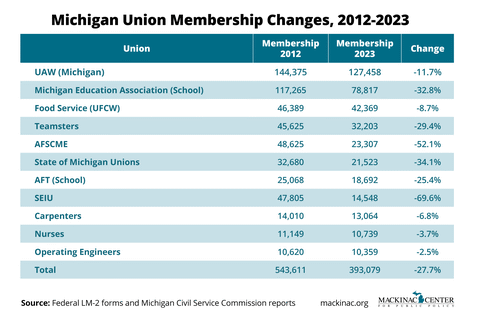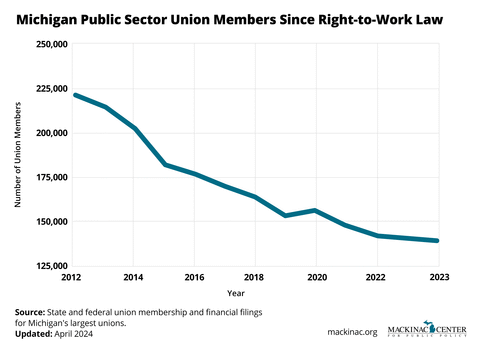Michigan’s largest unions have seen plummeting membership over the past decade
Jobs and incomes are up, workplace injuries are down
In recent years, most of Michigan’s largest labor unions saw massive declines in membership, despite significant job growth in most industries. The reason? A decade with right-to-work law, which gave workers the ability to choose whether to join a union, as a member or through a fee, or not.
The reports many labor unions are required to file with the federal government reveal the state of labor union membership, as do reports from the Michigan Civil Service Commission. Every one of Michigan’s 15 largest unions or so has seen a decline, whether in state government, schools, local government, or private industries such as construction or food service. But the declines are uneven. A variety of AFSCME associations, representing mostly state and local government workers, have seen a loss of more than half their members. The SEIU, which mostly represents workers in health care and local government, is down nearly 70%.
Despite job gains in the auto sector over the past decade and a highly publicized strike last year, the UAW branches in Michigan have lost 16,000 members over the past decade. Other private sector unions have seen fewer losses. These include the United Food and Commercial Workers (-8.7%), Michigan Regional Council of Carpenters (-6.8%), the Operating Engineers (-2.5%) and Michigan Nurses Association (-3.7%).
Losses in the public sector are much more pronounced than those in the private sector. The Michigan Education Association has now lost more than 38,000 members, or one-third, since the right-to-work law went into effect in 2013. The American Federation of Teachers branch, the bulk of which is in the Detroit Federation of Teachers, is down more than 25%. The Michigan public school system added 27,000 employees since 2012, but its largest employee unions have lost a combined 45,000 members.
The total number of public sector union members in Michigan has dropped by 80,000 since the right-to-work law was passed. Unions representing state of Michigan employees are down by more than one-third.
That may soon change. The Democratic-led Michigan Legislature repealed the state’s right-to-work law in 2023. The UAW and other unions representing workers for private employers can now require them to rejoin or pay fees. A 2018 ruling from the U.S. Supreme Court means that public sector employees such as schoolteachers still have the right to decline paying or joining a union.
Repealing the law is expected to boost union membership and financial support for the Democratic Party. In fighting in 2012 against a law allowing workers to opt out, SEIU Healthcare Michigan President Marge Faville said unions needed the forced funds to “make sure Democrats get [elected].” Just before legislators voted to enact a right-to-work law, a local Michigan Education Association leader sent an email out on a public server to tell other public school employees that “[emergency management] is the future in Michigan with a Republican governor and Legislature” and union members need to “[get] everyone we know to vote for Democrats.”
In the run-up to the law, opponents of right-to-work claimed there would be dire consequences. President Barack Obama predicted there would be fewer jobs and lower incomes, as did Gov. Gretchen Whitmer (then a state senator) and others. State Rep. Brandon Dillon said “workplace safety accidents” would “skyrocket.” UAW President Bob King said right-to-work would “destroy ... the middle class.”
None of these predictions bore out. From 2012 to 2022, Michigan incomes increased from $55,140 to $61,683, despite the COVID recession — an increase of more than $6,000 per year after inflation. Median household income went from $45,859 to $63,498, or 15% above inflation. Michigan added 382,000 jobs. Occupational injuries declined by 28%.
Michigan Capitol Confidential is the news source produced by the Mackinac Center for Public Policy. Michigan Capitol Confidential reports with a free-market news perspective.




 Hydra-Lock employees vote to decertify their union
Hydra-Lock employees vote to decertify their union
 Caregivers protest union effort to skim home helpers’ pay
Caregivers protest union effort to skim home helpers’ pay
 Right-to-work no longer rules in private sector
Right-to-work no longer rules in private sector

 Degrowth and decarbonization will harm people
Degrowth and decarbonization will harm people
 Gretchen Whitmer’s Michigan: Red tape and orange barrels
Gretchen Whitmer’s Michigan: Red tape and orange barrels
 No, Michigan climate policy won’t improve the weather
No, Michigan climate policy won’t improve the weather